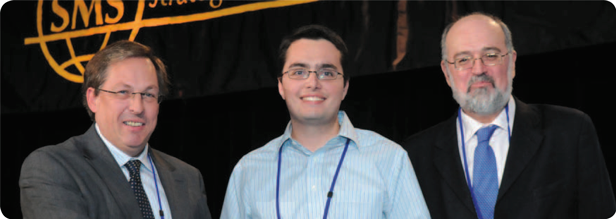
Cultivating Thought Leaders
Thursday, September 1, 2011
By Kevin Moe
Where does the next generation of business researchers get their beginnings? The PhD program at the Carlson School has provided the answer, supporting and stimulating its students to reach new pinnacles of business scholarship.
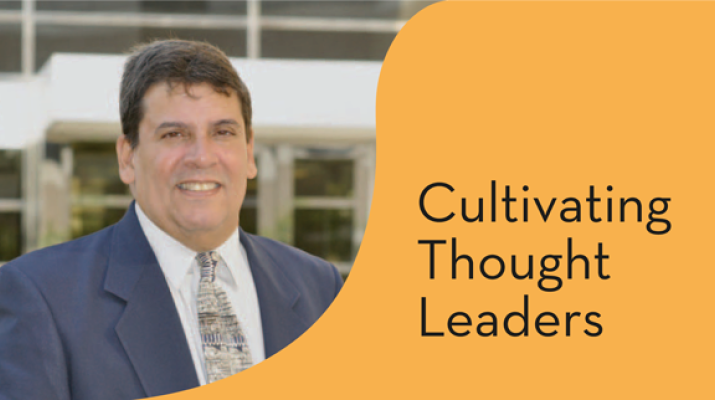
Even though economics teaches you to think rigorously, it is important to consider other aspects of a firm when trying to understand decisions.
Studying the Family Business – Luis Gomez-Mejia, '81 PhD-IR
Benton Coconaugher Chair in Business Administration, Mays Business School, Texas A&M University, College Station
Advisor – Professor George Milkovich
After receiving his bachelor’s degree in economics, Luis Gomez-Mejia wanted another area of study under his belt. “Even though economics teaches you to think rigorously, it is important to consider other aspects of a firm when trying to understand decisions,” he says. “For this reason, I joined the doctoral program in industrial relations.”
He is now a professor of management at Texas A&M and the inaugural holder of the Benton Coconaugher Chair in Business Administration. His research interest has led him to many areas, including executive compensation, incentive systems, and international management. “During the past 10 years, I have done a lot of research in the area of family business,” he says. “My research shows that incentive systems are critical in accomplishing, or failing to accomplish, organizational goals. Second, most of my recent research shows that family firms tend to be guided by the pursuit of what I call socioemotional utilities – such as retaining family control, appointing trusted relatives to key positions, family dynasty and the like – and not only the pursuit of financial goals.”
Gomez-Mejia says the doctoral program changed his life and allowed him to pursue many kinds of interests both in the United States and abroad. “I was very fortunate to work with brilliant people at the University of Minnesota, including George Milkovich, Thomas Mahoney, George England, and Herb Heneman, among many others,” he says. “I still have a passion for research that I would attribute to the excellent training that I received.”
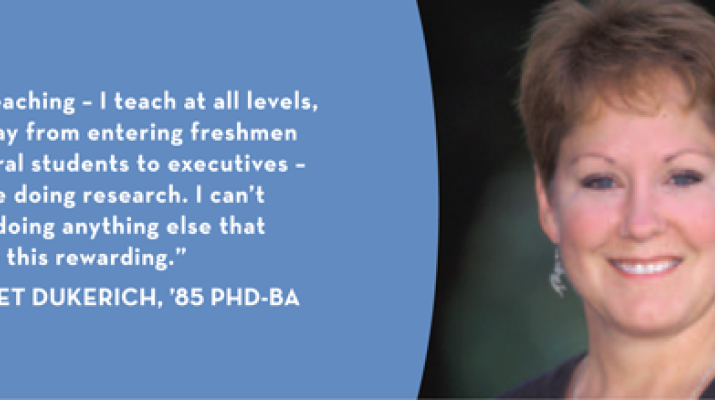
I love teaching – I teach at all levels, all the way from entering freshmen to doctoral students to executives – and I love doing research. I can’t imagine doing anything else that would be this rewarding.
From Social Psychology to Organizational Behavior –
Janet Dukerich, ’85 PhD-BA
Harkins & Company Centennial Chair, McCombs School of Business, The University of Texas at Austin
Advisor – Professor Mary Nichols
“When I started college, I knew I wanted to get a PhD,” says Janet Dukerich, describing her educational path that brought her to the Carlson School. “After my master’s degree in social psych, I switched over to organizational behavior because I thought the topics I was studying – cognition, issue interpretation, hypothesis testing – would be interesting to examine in an organizational context.”
After graduation, Dukerich found herself in an academic position at New York University. “I had the opportunity to work on a project examining how the Port Authority of New York/New Jersey dealt with the issue of increasing numbers of homeless individuals living in their facilities and that research study had a profound impact on my career,” she says. “I began to be interested in research topics such as organizational identity, reputation, image, and identification processes.” Most recently, Dukerich’s research has been focused on how organizational members create an identity in newly formed organizations.
After four years at NYU, Dukerich went to the University of Texas at Austin and has been there ever since. “I feel blessed to have been in academia all my life,” she says. “I love teaching – I teach at all levels, all the way from entering freshmen to doctoral students to executives – and I love doing research. I can’t imagine doing anything else that would be this rewarding.”
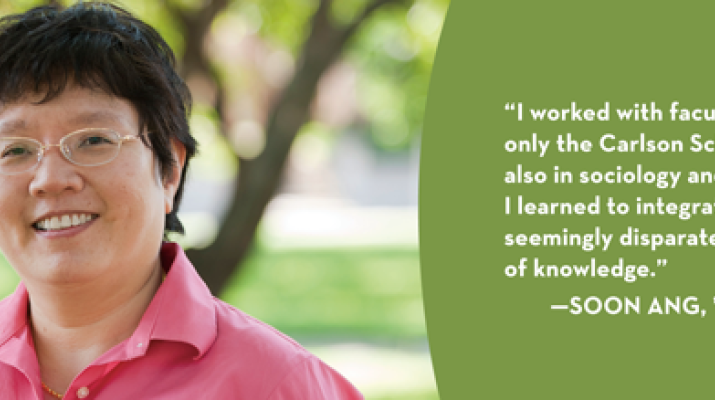
I worked with faculty from not only the Carlson School, but also in sociology and psychology. I learned to integrate many seemingly disparate bodies of knowledge.
Transcending Organizational Boundaries – Soon Ang, ’93 PhD-BA
Goh Tjoei Kok Distinguished Professor in Management, Nanyang Business School, Nanyang Technological University, Singapore
Advisors – Professors Detmar Straub and Larry Cummings
After receiving her undergraduate degree from the National University of Singapore, Soon Ang was wondering what to do next. “I was inspired by a key undergraduate mentor, the late Professor Teck Meng Tan, dean of the Nanyang Business School, who encouraged a group of us to consider academia as a viable career,” she says.
At the time, there was a dearth of local faculty with doctorate degrees in Singapore. Most of the faculty were expatriates from the United Kingdom, Canada, and the United States.
In order to boost local talent, the government endowed an education program to send people overseas on a full scholarship. Upon completion, the student would need to come back to Singapore to work for at least five years.
Ang took advantage of this opportunity, earning her master’s degree at the University of New South Wales before arriving at the Carlson School to pursue her PhD.
Her area of research dealt with outsourcing, offshoring, and cultural intelligence. “I was always interested in boundaries – the in-between-spaces,” she says. “My research focuses on cultural intelligence – the capabilities of individuals and organizations to function effectively in these in-between spaces. I explore effective strategies individuals and organizations adopt as they transcend national, organizational, functional, and intercultural boundaries.”
Transcending boundaries seeped into her PhD life as well, as Ang found many learning opportunities in interdisciplinary work. “We were encouraged to work with as many faculty as possible, and in as many diverse disciplines as possible,” she says. “So, I worked with faculty from not only the Carlson School, but also in sociology and psychology. I learned to integrate many seemingly disparate bodies of knowledge.”
Ang says her PhD experience at the Carlson School was the best time of her life and she describes it with five E’s: Energized, engaged, enlightened, enjoyable, and exploration. “Minnesota gave me a chance to branch out to be a world-class researcher in both management and information systems,” she says.
Connecting Business to Demographics – Exequiel Hernandez, ’11 PhD-BA
Assistant Professor of Strategy, Olin Business School, Washington University, St. Louis
Advisors – Professors Aks Zaheer and Myles Shaver
Exequiel Hernandez is relatively new to the PhD world, as he completed his requirements by defending his thesis in May 2011. His thesis already received attention prior to his defense; a paper based on his dissertation, “Immigrant Agglomeration, Firm Heterogeneity, and FDI Location Choice: Evidence From the United States,” was honored at the Strategic Management Society Annual International Conference in 2009 (pictured). Hernandez took home the prizes for Best Conference PhD Paper and Best Practical Implications Paper, and out of 833 submissions, Hernandez was one of 10 finalists for Overall Best Paper.
Hernandez decided to get his PhD in strategic management, as he found this field to be the most personally stimulating. “I came into the PhD program highly interested in the internationalization of business, especially in where and why companies located their foreign operations,” he says. “It struck me that corporate movements across countries had to be related to human movements. However, research had generally not connected the two phenomena. Business scholars studied corporate mobility and demographers studied human mobility, but they didn’t talk to each other. So I got excited about connecting the two.”
He found that the concept of business networks, such as alliances or relationships with local resource providers, was really helpful in linking the two ideas. Hernandez’ research showed that foreign companies investing in the United States tend to locate their subsidiaries in states with high numbers of immigrants from their homeland. Also, this placement is good for the performance of the companies because the immigrants help them obtain resources that are useful to succeed in the U.S. market. These findings suggest ways in which companies can strategically use their networks to successfully expand abroad.
“What gets me excited is that these are relevant issues for which I hope to provide insights backed up by rigorous research,” Hernandez says. “One of the most exciting aspects of research for me is the feeling of creating a new, original piece of knowledge that provides insights into things we see all around us but can’t explain very well yet.”
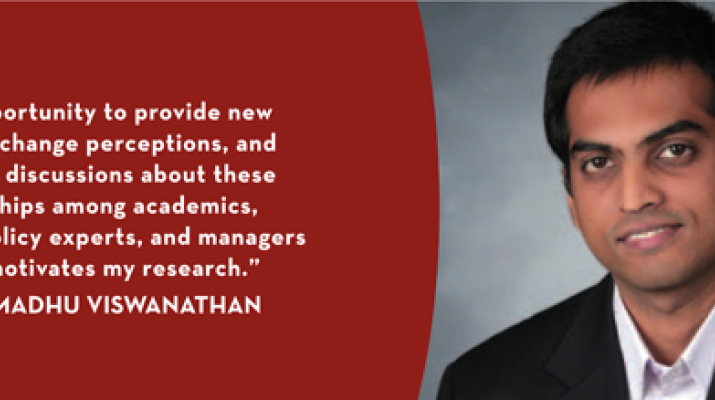
The opportunity to provide new insights, change perceptions, and motivate discussions about these relationships among academics, public policy experts, and managers is what motivates my research.
Category Captaincy – Madhu Viswanathan, ’12 PhD-BA (expected)
Advisors – Professors Om Narasimhan and George John
As a naturally inquisitive person, a PhD was an easy choice to make for Madhu Viswanathan, who is expected to earn his doctorate in marketing in 2012. “I used to be chided as a kid for being frustratingly annoying with my questions,” he says. “This turned out to be a valuable asset for the PhD program.”
Viswanathan’s area of research is on inter-firm relationships and their impact on performance. “I am working on papers that examine various issues like core component outsourcing, sales force compensation, and loyalty programs on a variety of industries ranging from high-technology markets like HDTVs to grocery retail,” he says. His dissertation is on an arrangement called “Category Captaincy.” This is an arrangement where a retailer lets one of the manufacturers, or “captains,” manage the category for him or her.
“Imagine a situation where Coca-Cola is advising the retailer on what Pepsi products to stock and you have category captaincy,” he says. “My study tries to understand how this arrangement impacts rival manufacturers, retailers, and consumers. I show that this arrangement can be surprisingly beneficial to both the channel and consumers.” Viswanathan’s results suggest that manufacturers are more efficient than retailers in managing assortments and this leads to a better mix of choices for consumers.
The significant real-world applications of his research Viswanathan especially cherishes. “The opportunity to provide new insights, change perceptions, and motivate discussions about these relationships among academics, public policy experts, and managers is what motivates my research,” he says.
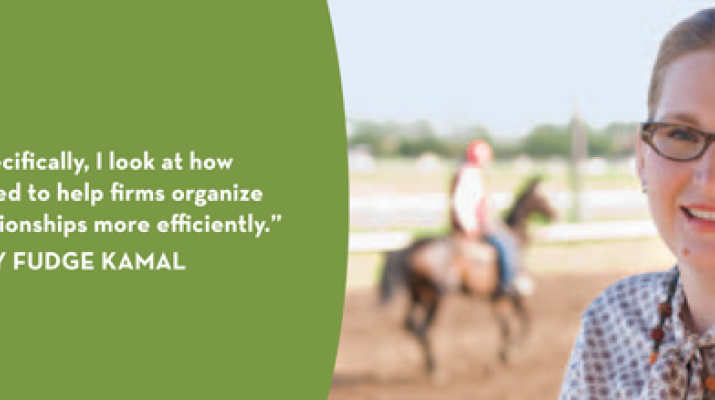
More specifically, I look at how trust is used to help firms organize their relationships more efficiently.
Business Alliances and Horses – Darcy Fudge Kamal, ’12 PhD-BA (expected)
Advisor – Professor Aks Zaheer
In her senior year as an undergraduate, Darcy Fudge Kamal collaborated with a marketing professor on a paper on globalization and later presented it at an academic conference. “I was hooked,” she says. “I discovered I had a passion for research and academic discourse.”
Fudge Kamal’s area of research is within the field of business strategy. “I am particularly interested in the use of interorganizational relationships such as alliances and buyer-supplier relationships as a means to improve firm performance,” she says. “More specifically, I look at how trust is used to help firms organize their relationships more efficiently.”
Her dissertation involves strategic alliances in the Thoroughbred horse industry. “Last summer through my fieldwork in Kentucky, the horse capital of the world, I gained access to unique archival data on alliances surrounding Thoroughbred auctions and breeding,” she says. “I theorize on the effects of alliance termination on the former partners’ ability to re-form their relationship in future periods. Despite possible failures that may influence their trust, the partners may yet re-form the alliance based on how the firms learn to manage the termination positively.”
Fudge Kamal’s use of horses in her research harkens back to her interests as a teenager, when she wanted to be a veterinarian. “I spent a summer shadowing veterinarians in preparation for vet school,” she says. “It was my colleagues and advisor who encouraged me to pursue the horse industry context for my research problem.”
Slated to graduate in 2012, Fudge Kamal has already presented her work at the Industry Studies Conference in June and will present at the Strategic Management Society Conference in November. Her work also won the U of M Graduate School Fellowship. “In the future, I plan to join a department at another world-class university that is as supportive as the Carlson School,” she says. “One that encourages me to ask interesting questions and work on fun groundbreaking research projects involving surprising elements, like horses.”
